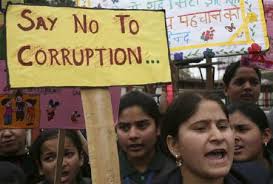प्रिय ब्लोगी मित्रों ,
मुझे पता है आप सब भ्रष्टाचार के प्रति चिंतित हैं . जब मनमोहन चिंतित हैं तो समझो सारा देश चिंतित है .
हम बड़ी बड़ी दिमागी कुलाचे भर रहे हैं. पर जो व्यक्ति अंग्रेजी जानते हैं, उन्हें ये लेख जरूर पर्हना चाहिए ,
यह वर्ल्ड बैंक की और से लिखा गया है .
पूरा लेख लिंक पर उपलब्ध है
मुझे पता है आप सब भ्रष्टाचार के प्रति चिंतित हैं . जब मनमोहन चिंतित हैं तो समझो सारा देश चिंतित है .
हम बड़ी बड़ी दिमागी कुलाचे भर रहे हैं. पर जो व्यक्ति अंग्रेजी जानते हैं, उन्हें ये लेख जरूर पर्हना चाहिए ,
यह वर्ल्ड बैंक की और से लिखा गया है .
पूरा लेख लिंक पर उपलब्ध है
how singapore and other countries fight corruption :
this is a wonderful ,concise report about the corruption ending case study of some countries, including singapore.

this is a fantastic report :
Anti-Corruption Commissions: Panacea or Real Medicine to Fight Corruption?
John R. Heilbrunn
2004. 21 pages. Stock No. 37234
link :
http://siteresources.worldbank.org/WBI/Resources/wbi37234Heilbrunn.pdf
\Contents
Introduction 1
Hong Kong’s ICAC: The Universal Model 3
Singapore’s CPIB: the Investigative Model 5
The New South Wales ICAC: the Parliamentary Model 7
The United States Office of Government Ethics: the Multi-Agency Model 9
Other Experiences 10
Unraveling the Puzzle 13
Conclusion 14
Endnotes 16
worthful notings :
Anti-corruption agencies are part of a number of strategies that together can reduce venality in a
government. Some of these strategies are absolutely crucial, including
first the independence of a commission.
Second, commissions need a clear reporting hierarchy that comprises executive
officials, parliamentary authorities, and oversight committees.
Third, governments must have a commitment to enact reforms that may be politically difficult. How a government is able to enact
these strategies requires negotiations among key actors in the government, civil society, and the
media.
Second, a commission must be independent from interference by the political leadership.
In some circumstances, a commission linked to the executive branch is used to settle old scores with
political rivals. When the agency is linked only to the Parliament, then the security agencies have
a disincentive to include parliamentary committees in their investigations. A competitive
relationship may evolve among parliamentarians and national crime investigators. The anticorruption commission thereby loses credibility as nothing more than a tool of the parliament.
Third, a clear reporting hierarchy may seem elementary, but it is not a straightforward arranagement. An optimal a hierarchy might be reports delivered to the director of the
organization, \


this is a fantastic report :
Anti-Corruption Commissions: Panacea or Real Medicine to Fight Corruption?
John R. Heilbrunn
2004. 21 pages. Stock No. 37234
link :
http://siteresources.worldbank.org/WBI/Resources/wbi37234Heilbrunn.pdf
\Contents
Introduction 1
Hong Kong’s ICAC: The Universal Model 3
Singapore’s CPIB: the Investigative Model 5
The New South Wales ICAC: the Parliamentary Model 7
The United States Office of Government Ethics: the Multi-Agency Model 9
Other Experiences 10
Unraveling the Puzzle 13
Conclusion 14
Endnotes 16
worthful notings :
Conclusion
Anti-corruption agencies are part of a number of strategies that together can reduce venality in a
government. Some of these strategies are absolutely crucial, including
first the independence of a commission.
Second, commissions need a clear reporting hierarchy that comprises executive
officials, parliamentary authorities, and oversight committees.
Third, governments must have a commitment to enact reforms that may be politically difficult. How a government is able to enact
these strategies requires negotiations among key actors in the government, civil society, and the
media.
Second, a commission must be independent from interference by the political leadership.
In some circumstances, a commission linked to the executive branch is used to settle old scores with
political rivals. When the agency is linked only to the Parliament, then the security agencies have
a disincentive to include parliamentary committees in their investigations. A competitive
relationship may evolve among parliamentarians and national crime investigators. The anticorruption commission thereby loses credibility as nothing more than a tool of the parliament.
Third, a clear reporting hierarchy may seem elementary, but it is not a straightforward arranagement. An optimal a hierarchy might be reports delivered to the director of the
organization, \

1 comment:
vicharniy.
Post a Comment